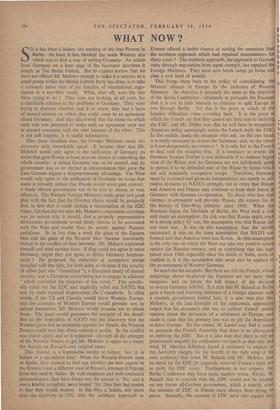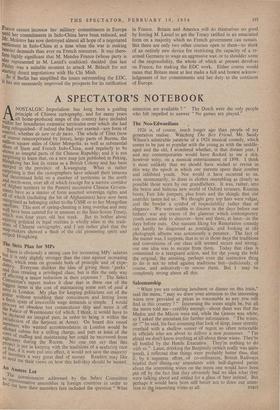WHAT NOW ?
S0 it has been a failure, the meeting of the four Powers in Berlin. At least it has blocked the main Western aim which was to find a way of uniting Germany. An article Everest offered a better chance of scaling the mountain than Is,' the northern approach which had repulsed mountaineers fot thirty years ? The northern approach, the approach to German n unity through negotiation from equal strength, has repulsed the 'F Foreign Ministers. They must now break camp; go home and s plan a new kind of assault. This brings them back to the poliCy of consolidating the Western alliance in Europe by the inclusion of Western Germany. Its objective is precisely the same as the objective of the Berlin Conference—ultimately to persuade the Russians that it is not in their interests to continue to split Europe in two through Berlin. Yet this is the point at which all the familiar difficulties come crowding back. It is the point at which the French say that they cannot see their way to ratifying the EDC, and Mr. Dulles says that he will have to reappraise American policy agonisingly unless the French ratify the EDC, In the middle, stand the escapists who ask, on the one hand, is it really necessary to re-arm the Germans; and, on the other, is it not dangerously provocative '? It is only fair to the French to deal with the escapists first. It is necessary to re-arm the Germans because Europe is not defensible if its defence begins west of the Rhine, and the Germans are not indefinitely going to permit it to be defended east of the Rhine by forcbs which are still nominally occupation troops. Therefore, Germany must be re-armed and given its independence not merely to add twelve divisions to NATO's strength, but in order that Britain and America and France may continue to keep their forces in Germany with German co-operation. To those who fear that German re-armament will provoke Russia, the answer lies in the history of East-West relations since 1948. When the Russians began the blockade of Berlin, the West took a risk and made an assumption; the risk was that Russia might react to a strong policy by war, the assumption was that Russia did not want war. It was on this assumption that the air-lift succeeded; it was on the same assumption that NATO was formed and that America went into Korea. As this assumption is the only one on which the West can take any positive action against the Russian menace, and as everything that has hap• pened since 1948, especially since the death of Stalin, tends to confirm it, it is the assumption that must also be applied to the re-armament of Western Germany. So much for the escapists. But there are still the French, whose misgivings about re-arming the Germans are far more than escapism, and on whom the full impact of the decision to re-arm Germany will fall. It is true that M. Bidault at Berlin gave a brave and touching imitation of a foreign minister with a resolute government behind him; it is also true that Mr.
Molotov, in the last fortnight of the conference, apparently forgot that his secondary aim was to confuse French public opinion about the prospects of a settlement in Europe, and made it clear that his primary aim was to get the Americans to leave Europe. To this extent, M. Laniel may find it easier to persuade the French Assembly that there is no alternative to ratifying the EDC. But it is also true that there is still no government majority for ratification—so much so that only last week M. Maurice Schuman found it necessary to explain to the Assembly (largely for the benefit of the right wing of his own coalition) that when M. Bidault told Mr. Molotov that he stood by the EDC he expressly reserved France's right not to ratify the EDC treaty. Furthermore, in two respects the Berlin Conference may have made matters worse. Firstly, M. Prance cannot increase her military commitments in Europe until her commitments in Indo-China have been reduced, and M. Molotov has now destroyed almost all hope of a negotiated settlement in Indo-China at a time when the war is making heavier demands than ever on French resources. It was there- fore highly significant that M. Mendes France (whose party is also represented in M. Laniel's coalition) decided that last FridaY was a suitable moment to attack M. Bidault for not starting direct negotiations with Ho Chi Minh. So if Berlin has simplified the issues surrounding the EDC, it has not necessarily improved the prospects for its ratification in France. Britain and America will do themselves no good by forcing M. Laniel to get the Treaty ratified in an emaciated form on a majority which no French government can sustain. But there are only two other courses open to them—to think of an entirely new device for restricting the capacity of a re- armed Germany to wage an aggressive war, or to shoulder some of the responsibility, the whole of which at present devolves on France, for making the EDC work. Either course would mean that Britain must at last make a full and honest acknow- ledgement of her commitments and her duty to the continent of Europe.



































 Previous page
Previous page